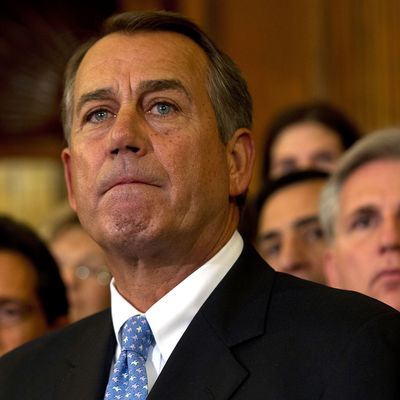
The payroll tax debacle is now the third suicidal episode undertaken by the House Republicans since they took control at the beginning of the year. The first was when they voted almost unanimously for Paul Ryan’s budget, which was filled with grist for attack ads – huge cuts to Medicare, big tax cuts for the wealthy, deregulating Wall Street – despite it having no chance of passing this term. The second was when they played chicken with the debt ceiling and turned a once-routine procedure into a white-knuckle game of chicken with the world economy. And then this week, when they attempted to extract concessions in return for extending the payroll tax holiday, an anti-recessionary measure with strong support from economists, businesses, and voters. These are not just gestures. The right-wingers are really trying to off themselves.
The payroll tax debacle most closely resembles the debt ceiling fight, which probably explains why House Republicans decided to do it. During that episode, a large chunk of Republicans genuinely did not want to lift the debt ceiling, and others either did want to, or were willing to, but decided to use the threat of economic calamity to wring policy concessions out of President Obama. The episode cost Republicans public support, but it hurt Obama as well, and it did get them the spending cuts they wanted.
So they decided to try it again with the payroll tax holiday. Numerous conservatives have grown convinced that middle-income earners pay too little in taxes, and thus that it would make sense on the merits to end the payroll tax break. Others just wanted to hold it hostage.
Republicans have taken to arguing that the dispute lay in their desire to extend the payroll tax for a full year rather than two months, but this is pure nonsense. If they really wanted a yearlong extension, they would have done it long ago. The only reason the parties agreed to a two-month extension rather than a year is that Republicans complicated the negotiations by adding unrelated demands, like expedited approval of the Keystone pipeline and unrelated spending cuts. (They have never maintained that income tax cuts, which benefit the rich far more than cuts in the regressive payroll tax, require spending cut offsets.) The payroll tax became a hostage exercise, and the only way to beat the deadline and avoid at least a temporary expiration was to approve a short-term extension to buy time to negotiate the party’s own hostage demands.
But this time Democrats refused to hand over the ransom. One reason is that, since the debt ceiling debacle brought about in part by his own weakness, Obama has found his political footing by detaching himself from congressional procedure and standing in stark opposition to Republicans. The second reason is that the Obama administration was genuinely terrified of failing to lift the debt ceiling, and while it wants to extend the payroll tax holiday, missing the deadline in a game of chicken wouldn’t cause massive, irreparable harm.
Republicans, possibly overconfident from their debt ceiling hostage caper, seemed not to contemplate the possibility that Democrats would hold together then blame them for failure. They ended up eroding their own credibility on taxes, general competence, and willingness to take action to help the economy.
The broader question here is whether it will matter. There is a debate about whether it is actually possible for a congressional party writ large to actually turn the public against it. Some research suggests that the public, except for strong partisans, pays little attention to politics and holds the president responsible for everything, so Republican misgovernance is liable to hurt Obama at least as much as it hurts Republicans. (This seemed to happen during the debt ceiling crisis, when both Obama and the congressional GOP lost public support.) Others suggest it isn’t so obvious this will hold up – that the Republicans have flouted public opinion more brazenly and dangerously than any previous congressional party.
What does seem clear is that congressional Republicans have badly damaged their standing. They took the political heat for opposing the payroll tax holiday but didn’t stop it. (And Democrats will surely be even less willing to pay a ransom after the two-month extension ends, having seen Republicans cave this time.) Obama’s polling numbers are rising, though it’s hard to know if this is owing to an improving economy or his new strategy of standing up to the Republicans, rather than get pulled into the muck of fruitless negotiations with them. The House GOP has grown wildly unpopular and has put itself at real risk of losing control of the place in next year’s elections. A plurality of Americans now think the Democrats did a better job of running the House.
Maybe the next election will be driven entirely by the old dynamic of voters holding the president responsible for the state of the economy. But the Republicans are doing everything they can to test that.






























